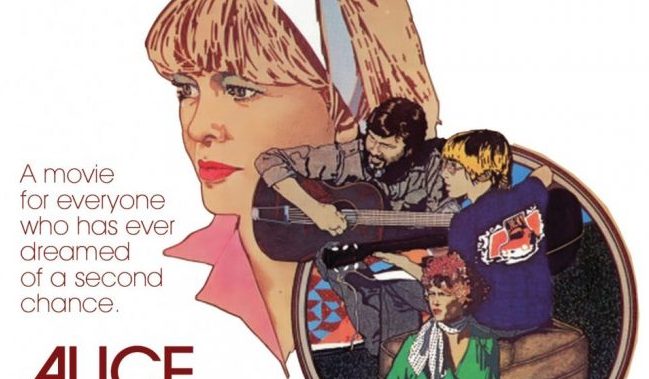
Alice Doesn’t Live Here Anymore (1974) DVD Review

Way back in 1980 BBC2 ran a season of films they titled the Great American Picture Show. These were a series of films from America all made in the early to mid 1970s and included among other great films shown were The Last Picture Show (1971), Badlands (1973) and Summer of ’42 (1971), as well as films rarely seen these days including Scarecrow and The Harrad Experiment (both 1973). Another of these films that made quite an impression on me was Alice Doesn’t Live Here Anymore (1974) and portrayed a strong image of a different side of America – a more realistic one of white collar Americans or those living outside of the big urban centers. Alice Doesn’t Live Here Anymore has a strong sense of place and location. It is also a women’s melodrama, made all the more surprising that it was directed by Martin Scorsese, away from the usual New York settings. But the film was very much Ellen Burstyn’s project. On the main extra on the disc Burstyn said that she approached Francis Ford Coppola for a new, exciting and dynamic director. Coppola suggested she see Scorsese’s most recent film Mean Streets (1973). She was sold but with reservations. There were rarely any main female characters in his films and when she tackled him over this he said that he didn’t know much about women but wanted to learn. After this he was hired.
The opening of the film is also jarring next to the rest of the film. The credits show script credits over red satin played to Alice Faye singing ‘You’ll Never Know’. It looks like the opening credits to a 1940s musical or 50s women’s melodrama. The opening scene is shot in a vivid red colour and an artificial, almost buccolic rural environment recalling the images of Kansas in The Wizard of Oz. A title tells us this is Monterey and Alice is a young girl. It is a romantic idealised and nostalgic image of a childhood. The next scene jars us with shots of a New Mexico suburban street played to Mott the Hoople’s rollicking ‘All the Way From Memphis’ with contemporary realism. We are introduced back to Alice (Burstyn), 27 years later than in the opening scene. Alice is married to Donald (Billy Green Bush) in what is a mess of a marriage with him distant and aaggressive and Alice a housewife caught up in her private world and struggling to bring up their 11-year-old son Tommy (newcomer Alfred Lutter), an annoying and cocky boy (what Jodie Foster’s character later calls “weird”). He is in many senses a lynchpin character. Suddenely Donald is killed in a traffic accident and Alice decides to sell her possessions and move back to childhood hometown in Monterey, California. She sets out on the road with her son and a car full of belongings. On the way they stay at a motel in Phoenix, Arizona. She gets a regular job as a singer in a bar (the only job she has ever done as she tells Tommy) while Tommy is left bored in the motel. She is given the (unwanted) attentions from Ben (Harvey Keitel) who is at first persistant and charming but turns out to be violent and married. Alice becomes scared and in haste goes on the road again, this time winding up in Tucson. The only job she is able to find is as a waitress at a diner and initially feels that this is beneath her. She doesn’t take too well to the brassy Flo (Diane Ladd) and also works with the incompetent and insecure Vera. Alice is also charmed by a rancher (Kris Kristofferson). At the diner Alice finds a comradeship at the diner and begins to take on a new perspective on life.
The release on BFI’s own label follows the recent retrospective on Scorsese at the National Film Theatre and coincides with the release of the Italian-American’s first film, the low budget Who’s That Knocking at My Door (1968). However, as already mentioned here this was less Scorsese’s film and more Ellen Burstyn’s who brought this project to the screen and helped push Scorsese’s career in a fresh direction. It earned Burstyn an Oscar and a nomination for Ladd in the Best Supporting Actress role. The film stands the test of time and acts as an interesting document of America in the 1970s. It has been suggested that this film is a 2nd wave feminist film, all the more remarkable then given Scorsese’s own self-confessed lack of understanding of women or women’s films, presenting a new age of the Douglas Sirk women’s melodrama. The success of Alice led to a long running and popular TV series that ran for over 200 episodes (Vic Tayback who plays the role of Mel, the owner of the diner repeated his role and Lutter appeared as Tommy only in the pilot episode). It is wonderful to see this re-release of this great American picture.
Chris Hick
